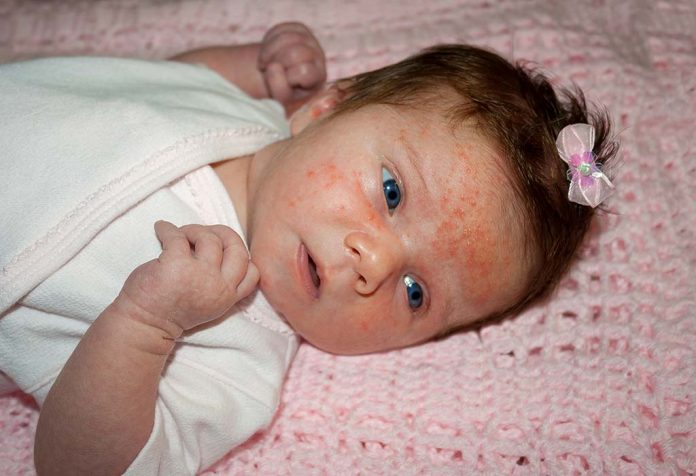Babies are prone to getting rashes, and obviously, you will worry if your baby has rashes. But, you don’t have to worry as rashes can be treated. As a parent, we know, you wouldn’t want to use chemical-based creams or lotions on your baby’s face to address the rashes, which is why we bring some home remedies for you to take care of your baby’s skin.
How to Cure Rashes on Baby’s Face at Home
Here are some things that you can do to take care of rashes in a safe way:
1. Oatmeal Blend

Oatmeal is known to help relieve the irritation that is caused by itching on the skin. The reason behind this is that oatmeal contains Avenanthramides which are a known anti-inflammatory. The way to go about it is to take about one bowl of organic oatmeal and add it to water. Then, put this in a blender and mix until it becomes a paste. Apply this on the skin and remove when it has dried. However, before applying it on your baby’s face directly, apply it to his arm to check for an allergy. If your baby isn’t allergic to oats, you can use this for a rash.
2. Chamomile Tea
It contains antioxidants that help in disinfecting wounds and alleviating skin rashes. Depending on the size of the rash, you may need to use one or more tea bags. Place the bags in hot water and after boiling, allow it to cool. When the water is lukewarm, take the bags out of the water and place it on your baby’s face. Ensure that the tea bags are not too hot.
3. Yoghurt

Skin rashes like eczema occur due to malfunctioning on the immune system. The bacteria found in yoghurt can help boost the immune system and at the same time alleviate the rash symptoms like itching.
4. Banana Peels

Banana peels might be used as comic relief in many cartoons, but these are also excellent skin rash treatment tools. First, refrigerate the banana peels for about an hour or so. Then, apply a small piece to the affected area and let it do its magic! This will not only help in cleansing of the skin and moisturise it properly but make your baby feel fresh and rejuvenated, taking his mind of the irritating rash for some time.
5. Neem

Neem has been used for centuries in India for its amazing benefits for the skin. It has anti-fungal and anti-inflammatory properties that help treat and alleviate skin rashes. Eczema is one skin condition that can be successfully tackled with the help of neem. You can buy neem leaves and make a paste out of it by adding water and grinding it. Apply the paste on the affected area to provide relief to your baby.
6. Aloe Vera

Aloe Vera is the holy grail for skin treatment which is why many creams have this vital ingredient. It contains antimicrobials, anti-inflammatory and emollient properties. While creams are available, it may also contain additives and artificial compounds that may negatively impact your baby’s sensitive skin. A better alternative would be to extract the aloe vera gel from the leaves directly. These leaves can be purchased from any leading supermarket.
7. Olive Oil

Olive oil is looked upon by many as a quick fix solution and for a good reason too! Olive oil is a natural cleanser and does an enormous task of removing unwanted toxins and allergens from the skin. It contains an ingredient called oleocanthal which helps to bring relief to any inflammation of the skin. Besides, it also contains antioxidants and Vitamin E which support the process of skin renewal and healing.
8. Cucumber

They include anti-inflammatory properties that help in reducing the skin rash on the face. Due to their gentle action on even the most sensitive skin, they are preferred by many parents. Cucumbers can be blended with oatmeal to form a thick paste. This can be applied to the affected area which helps alleviate the rash symptoms.
Babies have sensitive skin so avoiding over the counter creams with unnecessary chemicals would be a wise move. However, if none of the above remedies works, make sure that you speak to your paediatrician for alternative treatment.










